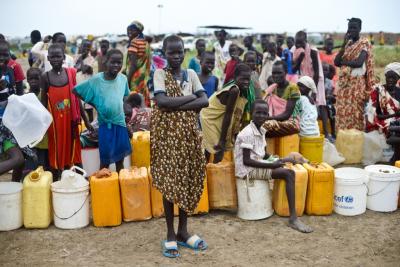Secondary menu
South Sudan: Pervasive Sexual Violence, Potential War Crimes and Crimes against Humanity in the World's Newest Country
 Ashley Major, 2L, Human Rights Watch (New York)
Ashley Major, 2L, Human Rights Watch (New York)
South Sudan became the world’s newest country in July 2011. Despite this newfound independence, South Sudan has been embroiled in bitter conflicts and wars ever since. A longstanding conflict between government and rebel forces escalated in April 2015. In June 2015, investigators with Human Rights Watch began to document atrocities being committed by government forces during this conflict. One of these investigators was my internship supervisor, Samer Muscati, who is also an alumnus of the Faculty of Law. While he was on the ground interviewing survivors, I was in New York trying to piece together exactly what had occurred over the past several months.
During my internship, I became accustomed to the barrage of horrific stories of rape and assault that seemed to emerge from every conflict I was researching: South Sudan was no exception. As I pored over hundreds of news articles and reports, I learned of the systemic rapes occurring. Samer interviewed many of these rape victims, several of whom had experienced gang rapes. Such attacks were often committed in public in order to shame and terrorize the victims. Others occurred at night as women left to use the latrines or gather firewood outside of camps for internally displaced persons. Samer also recorded evidence of murders, beatings, abductions, forced labour, theft and destruction of personal property carried out by government troops.
Samer and I then worked together to craft arguments against the perpetrators of these crimes to prove that that they had possibly committed war crimes or crimes against humanity. War crimes are defined as atrocities committed with a nexus to an armed conflict. Crimes against humanity are acts committed as part of a widespread or systematic attack, with knowledge, against a civilian population. An armed conflict is not a necessary condition for a crime against humanity.
I found this research to be both fascinating and incredibly frustrating. Alleging war crimes and crimes against humanity is one matter, but attempting to prove them is another. The argument that murder and rape should be considered crimes against humanity is straightforward, as both acts are included in its enumerated definition. Such acts have also resulted in convictions for both war crimes and crimes against humanity in the past. However, the arguments became more difficult for other crimes. These are some of the questions we faced: was the theft of cattle and destruction of personal property equivalent to a crime against humanity because it prevented people from practicing their livelihoods? Could this meet the requirement of “intentionally causing great suffering” under the enumerated ground of “other inhumane acts?” Could the burning of villages be considered “forcible transfer” (another enumerated ground for crimes against humanity) because it was unlawful and left citizens with no real choice but to flee? Should we try to put forward an argument that might expand the traditional understanding of what “transfer” means? Or, should we try to argue that such destruction should fall under the broader ground of “other inhumane acts?”
These questions demonstrated to me the complexities of international human rights law, international criminal law, and international humanitarian law. Although on their face these acts seemed to offend the collective conscience, and even when there was strong evidence that a rape, murder, or forcible transfer occurred, some acts simply did not meet the criteria of a war crime or a crime against humanity.
Another difficulty with charging a state or a government with a crime is that the political will or the legal avenues to prosecute simply may not exist. Ultimately, organizations like Human Rights Watch can only put the information out to those who have the jurisdiction to act on it. One can only hope that international institutions such as the United Nations, the African Union, and the International Criminal Court will live up to the recommendations laid out in the subsequent extensive report that Human Rights Watch authored on this conflict. While an international prosecution for possible war crimes or crimes against humanity will not mitigate the suffering that has already occurring in South Sudan, it may help prevent future acts from being committed with impunity.
Photo caption: Girls waiting in line for water in the UNMISS camp near Bentiu. As of the end of June, the camp had registered about 81,000 inhabitants, including at least 28,000 new arrivals in April and May who now reside in mostly cramped and unsanitary conditions. (Photo credit: Samer Muscati/Human Rights Watch)
